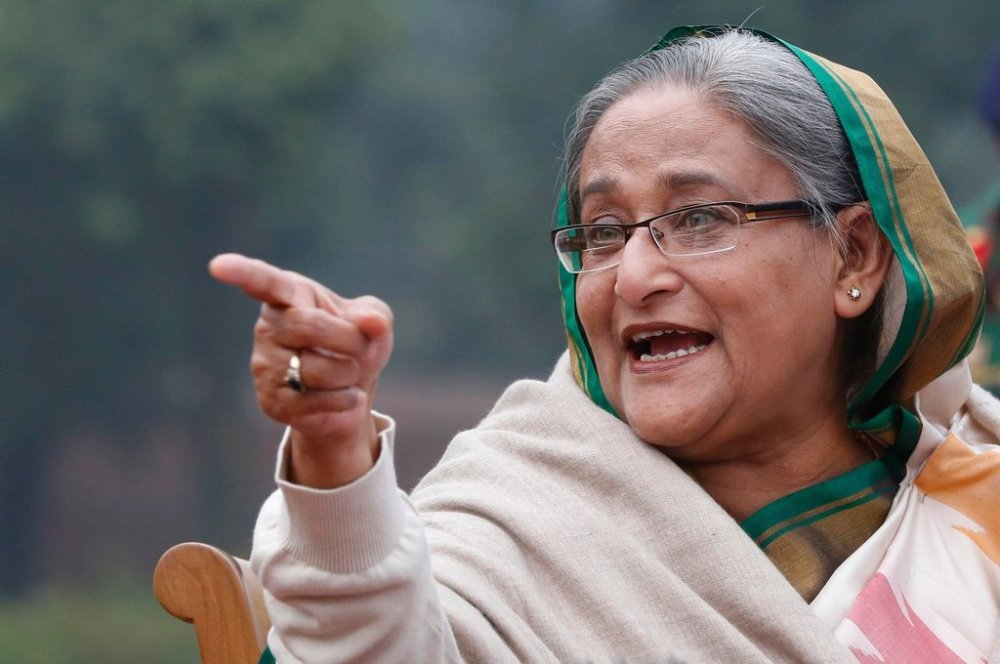Bangladesh tribunal sentences ousted leader Sheikh Hasina to death for crimes against humanity
Advertisement
Read this article for free:
or
Already have an account? Log in here »
We need your support!
Local journalism needs your support!
As we navigate through unprecedented times, our journalists are working harder than ever to bring you the latest local updates to keep you safe and informed.
Now, more than ever, we need your support.
Starting at $15.99 plus taxes every four weeks you can access your Brandon Sun online and full access to all content as it appears on our website.
Subscribe Nowor call circulation directly at (204) 727-0527.
Your pledge helps to ensure we provide the news that matters most to your community!
To continue reading, please subscribe:
Add Brandon Sun access to your Free Press subscription for only an additional
$1 for the first 4 weeks*
*Your next subscription payment will increase by $1.00 and you will be charged $20.00 plus GST for four weeks. After four weeks, your payment will increase to $24.00 plus GST every four weeks.
Read unlimited articles for free today:
or
Already have an account? Log in here »
DHAKA, Bangladesh (AP) — A special tribunal sentenced Bangladesh’s ousted Prime Minister Sheikh Hasina to death on charges of crimes against humanity for her crackdown on a student uprising last year that killed hundreds of people and led to the toppling of her 15-year rule.
The Dhaka-based International Crimes Tribunal also sentenced former Home Minister Asaduzzaman Khan to death for his involvement in the use of deadly force against protesters.
Both Hasina and Khan fled to India last year and were sentenced in absentia.

A third suspect, a former police chief, was sentenced to five years in prison after becoming a state witness against Hasina and pleading guilty.
Hasina and Khan were accused over the killing of hundreds of people during a student-led uprising in July and August of 2024. The country’s health adviser under the country’s current interim government said more than 800 people were killed and about 14,000 were injured. However, the United Nations in a February report said up to 1,400 may have been killed.
Hasina’s response
Hasina says the charges are unjustified, arguing that she and Khan “acted in good faith and were trying to minimize the loss of life.”
“We lost control of the situation, but to characterize what happened as a premeditated assault on citizens is simply to misread the facts,” she said Monday in a statement denouncing the verdict. She denounced the ruling, calling it “biased and politically motivated.”
“I mourn all of the deaths that occurred in July and August of last year, on both sides of the political divide,” she said. “But neither I nor other political leaders ordered the killing of protesters.”
The verdict comes as the country still grapples with instability after Hasina was ousted on Aug. 5, 2024. Bangladeshi Nobel Peace Prize laureate Muhammad Yunus took over as the head of an interim government three days after her fall. Yunus has vowed to punish Hasina and banned the activities of her Awami League party.
A three-member tribunal, headed by Justice Golam Mortuza Mozumder, announced the tribunal’s ruling, a session that was broadcast live.
Some of those in the packed courtroom cheered when Mazumder announced the death penalty for Hasina. He admonished them, telling them to express their feelings outside the courtroom.
Many families of the killed and the injured during last year’s uprising waited for hours outside the tribunal ahead of the verdict.
It appeared unlikely that Hasina would return to Bangladesh to face her sentence. India had not responded to requests by Bangladesh to extradite her to face the trial.
Tensions before and after the verdict
The interim government beefed up security ahead of the verdict, with paramilitary border guards and police deployed in Dhaka and many other parts of the country.
Hasina’s Awami League party called for a nationwide shutdown to protest the verdict on Monday.
Hasina cannot appeal the verdict unless she surrenders or is arrested within 30 days of the judgment.
A few kilometers away from the tribunal, Hasina’s opponents on Monday gathered outside her father’s home-turned-museum to demolish the rest of the establishment, which was looted and damaged earlier. They brought two excavators to demolish the building.
Police charged with batons and used stun grenades to disperse the crowd as the judges continued to read out the verdict, a process that took hours.
In the evening more than 300 people were still there and burned tires on streets as the security officials took their position.
Hasina’s son Sajeeb Wazed, currently in the United States, said in message to The Associated Press that the “verdict is a joke and meaningless. My mother is safe in India. The trials were so legally flawed they won’t survive any challenge once rule of law returns to Bangladesh.”
Tensions and disruptions had grown in the country in recent days ahead of the verdict.
Nearly 50 arson attacks, mostly targeting vehicles, and dozens of crude bombs explosions were reported nationwide over the past week. Two people were killed in the arson attacks, local media reported.
Authorities at the Supreme Court, in a letter to army headquarters on Sunday, requested the deployment of soldiers around the tribunal premises ahead of the verdict.
Yunus said his interim government would hold the country’s next elections in February, and that Hasina’s party would not get a chance to contest the race.
Bangladesh’s politics under Yunus has remained at a crossroads with limited signs of stability.
